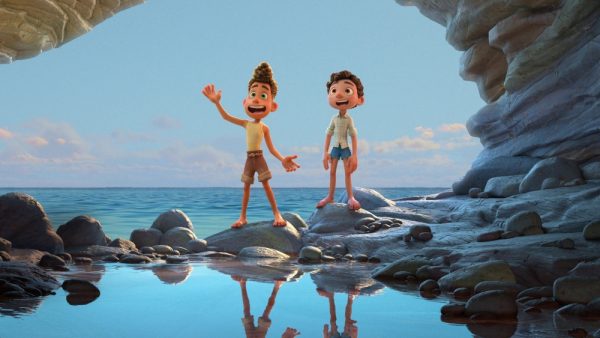Luca, 2021.
Directed by Enrico Casarosa.
Featuring the voice talents of Jacob Tremblay, Jack Dylan Grazer, Emma Berman, Saverio Raimondo, Maya Rudolph, Jim Gaffigan, Marco Barricelli and Sacha Baron Cohen.
SYNOPSIS:
A young sea monster with a fear of the surface finds himself bonding with a rebellious stranger, who introduces him to the human world.
When you’re a teenager, summer is everything. Two months without school creates a seemingly endless expanse of freedom in which anything is possible, from illicit WKDs in the park to adventures with friends and the forgotten joy of simply doing nothing. As the last few sentences suggest, adults have a tendency to romanticise the carefree world of adolescent summers, and this feeds into some great cinema, whether it’s Rob Reiner’s classic Stephen King adaptation Stand By Me or Jordan Vogt-Roberts’ deliciously odd The Kings of Summer. Pixar is now stepping forward into that world with the woozy, delightful coming-of-age tale Luca.
The movie serves as the feature directorial debut for long-time Pixar employee Enrico Casarosa, who was Oscar nommed for his 2011 short La Luna. Much like that film, Luca is a celebration of difference and of outsiders, boasting exactly the kind of malleable, all-purpose allegory Pixar is so often able to turn into gold. Visual similarities to Luca Guadagnino’s gay romance Call Me By Your Name had many hoping for a queer subtext and, while it’s not overtly present, there’s plenty of potential for anyone shy of expressing their real identity to feel seen by what Casarosa has made.
The movie’s title character, voiced by Hollywood’s go-to adorable teen Jacob Tremblay, is a sea monster constantly warned of the dangers of the “land monsters” by his parents (Maya Rudolph and Jim Gaffigan). A chance meeting with the free-spirited Alberto (Jack Dylan Grazer) sees him experiment with stepping on land and experiencing “The Change”, by which sea monsters appear human when they are dry. When Luca’s parents discover this, they threaten to send him to live with his strange, anglerfish uncle (Sacha Baron Cohen) in the deep ocean. This encourages him to join Alberto in fleeing to the nearby village of Portorosso, which has a murderous hatred for sea monsters.
Casarosa has been open about his influences, often citing Ghibli kingpin Hayao Miyazaki as a key guiding light. That influence certainly comes through in the woozy, idealistic feel that powers Luca. It’s less plot-driven than recent Pixar outings, with much of the narrative structured around the central duo teaming with another outsider in bullied local girl Giulia (Emma Berman) in order to beat the Vespa-riding narcissist Ercole (Saverio Raimondo) in an annual triathlon race involving swimming, cycling and eating a huge bowl of pasta.
The action is defiantly low-stakes for the most part, trading mostly in the liberation and freedom of Luca shedding the shackles of his protective parents for the first time. It’s the PG equivalent of a boozy lads’ holiday to Ayia Napa. But the relatively loose plotting doesn’t minimise the emotional heft, particularly as Luca’s increasingly charming friendship with Giulia makes Alberto jealous – in a neat, subtle touch, he’s quite literally a green-eyed monster. Luca faces a struggle between embracing and expressing pride in his true identity and the wider community he so desperately wants to join. He’s crippled by fear of prejudice, and this is a concept to which the movie adds significant and compelling wrinkles.
But above all else, this movie is just a delightful experience. Casarosa’s intimate connection to the location and tone – it draws heavily from his own childhood in Genoa – gives the world a richness and a heart that amplifies the sense of escapism. Dan Romer’s soaring score similarly catapults the audience into Luca’s daydream reveries and the enthralling excitement of a world ripe for discovery. Luca is a movie about walls coming down and boundaries fading away, with a real sense of limitless potential that will charm young viewers and evoke misty nostalgia in adults who recall those feelings.
Ultimately, despite its considerable charms, Luca emerges as a rather slight Pixar tale and it won’t sit amid the upper echelons of the studio’s exceptional output. We’re a long way from the adventure and emotion of Finding Nemo or the breath-taking complexity of Inside Out, but Luca feels like a movie landing at just the right time. After a year of being trapped in our homes, a story about exploration, excitement and broken boundaries feels like just what the doctor ordered.
Flickering Myth Rating – Film: ★ ★ ★ ★ / Movie: ★ ★ ★ ★
Tom Beasley is a freelance film journalist and wrestling fan. Follow him on Twitter via @TomJBeasley for movie opinions, wrestling stuff and puns.














